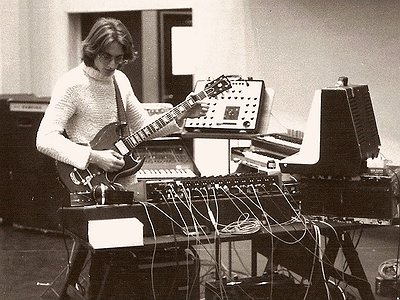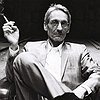Part 2
Writing for Film
What attracted me first with movies was to accompany a silent film live with electronic instruments.
My wife has just produced a film about the last silent-movie pianist in the world, still performing at the age of 101. So why not having a modern version playing with groove box, sampler and laptop, I thought? I didn't exactly plan it to be a soundtrack, it was meant more as a kind of concert to a movie. I thought of playing it with my electronic instruments in the way that I had done some fashion shows or the radio play Walking the desert, a live event.
But then the idea came up to play with the musicians of the Staatstheater Braunschweig. This was also intriguing, to write some scores for a small chamber ensemble for the film and to perform both, some parts electronic and some parts with musicians.
I haven't been involved in writing film music apart from very few examples.
~
With Le Berceau de Cristal, we had a very special situation. The French director Philippe Garrel was a very close friend, who simply liked our music and came to the concerts. I compiled a tape with music of one hour and gave it to him without having seen the movie before. His film is also a kind of silent movie with an experimental touch. No action, no words, only Nico, Anita Pallenberg and Dominique Sanda, the female ICONS of the 70s, on screen. And the music in full length accompanying the beautiful pictures.
For Der Junker und der Kommunist/The count and comrade, a film by my wife, I composed some pieces for guitar. Those could stand equally for the scenes in the movie as well as for themselves, even if they are very short. But in this case the pictures inspired me, indeed.
So yes, first of all, film music should work with the pictures. That is what it is made for in a movie. It should not necessarily stand for its own. But as I said, you can also start with the composition and then find some pictures for it. It is a different approach.
~
Would I consider doing music for another film in the future? Yes and no, it depends on the premises. If I am forced to look too much into some pictures over and over again, trying to find something special, to adapt something, I get lost. I rather prefer to see the entire movie once to get a feeling for the atmosphere, the story, and then forget about the pictures and start thinking about the composition in general.
Or - even better – I would start only with a rough idea without knowing the film at all; the more you know about it, the less is your imagination.
A Case against Musical Categories
I think the terms “classical” or “serious” are the most misused words in music, and “modern classical“ is just the peak of nonsense. In fact there was only a certain period and style in music called "classical". But as a common term, everybody says "classic music", even for baroque or middle age or twelve-tone music. I could live with the term "classical" if it is used for any old music, which has proven quality and influence. But the term “serious” is a real killer, especially in contradiction to “popular”. This is pure racism, officially existing as a classification by the GEMA only in Germany. Music had been played for many purposes but the so-called serious musicians/composers were all entertaining people. Beethoven and Mozart had played in small salons to entertain the upper class, what about Verdi? His operas were mass attractions. If this is serious, then any music by ABBA, Madonna or Robbie Williams is very serious.
This can only happen in poor Germany, whereas in England a Paul McCartney, an Elton John or even a Mick Jagger are honoured as a “Sir”. I’m fed up with this classification, and I must strongly recommend studying the history of music and their composers to prevent “serious” damages to their contemporary colleagues.
Music only makes sense when people are open to hear it, this implies its popularity, if it is a funny music, a sad music, music for a funeral, music for a wedding, religious music or dance music. If nobody wants to listen to it, if you don’t find an audience, there’s obviously something wrong with your music, and this is the same rule for a simple song as well as for a “sophisticated” piece of - let’s say - John Cage. Popular music, the way we interpret that term now, has not been around forever – it has developed over time, especially over the last century thanks to technical possibilities and the needs of society.
~
In the old days, music was strictly separated by guilds. There were clerical musicians, musicians at court, travelling artists and even a guild for musicians specialising in funerals. Mixing these influences was not so much impossible for musical, but rather for social reasons. Those playing at court naturally enjoyed a better life and turned out to be more famous, simply because their works got to be printed and published. Folk music was merely played in the villages. After all, it was not recorded and disseminated all over the world. It was exclusively passed on from one village to the other and a small parts of it have even been saved.
This means that the differentiation between “serious” and “popular” music constitutes nothing but an embarrassing step backwards and resembles the effort of re-introducing the old class society. If the so-called classical music in the sense of old music (by which one would mean popular, tried and tested) is subsidised, in order to save a piece of culture from extinction, then this is commendable. But to categorise a newly created piece of music a priori and to judge it in such a manner is simply censorship.
Just as much as society has changed and evolved and created new possibilities thanks to inventions in the realms of technology and the media, so too has popular music developed. Since the beginning of the last century, all efforts to establish a clear border to this kind of music have failed more or less. The music turned out to be more and more intellectual, the public was unable to follow and then failed to attend at all. It was only in the second half of the century and thanks to composers such as Steve Reich and Phil Glass that one started to become interested in contemporary music and concert halls were packed again.
I don’t want to oppose experiments of all kinds, after all I do count myself as a part of these. But this does show that you’re not a composer, if no one’s listening – regardless of the particular genre you’re in.
Originality and the "New"
Your own composition is always based on some fragments or chords you’ve heard somewhere else. The only thing a composer does is piece them together in a new way. This has absolutely nothing to do with copyright. If my material is stolen by DJs, it might not be such a pleasant thing. On the other hand, it’s a compliment all the same and proves to me that I’m creating a music, which is abundantly interesting to be used. Quite a few people don’t actually consider this theft at all.
In my opinion, things should stay within certain boundaries: If you start counting and applying miliseconds and millipercentages, things start getting ridiculous.
I always want it to be new - or something new to be part of it. I assume most would. There might be some exceptions, musicians who don’t want to come up with anything original, but rather aim at creating something in the style of something else. Apart from that, absolutely everyone, including Pop stars or so-called modern Classical composers, wants to create something new. If you’re painting a picture, you want it to be a new picture as well. Then again, there’s painters who are happy with the mere copying of certain styles. If that’s to your liking: Please go ahead.
But speaking for myself, I like to make new music and to think about the development of music, mine included. In the last 50 years of my life, much has changed – how will things continue in the next 50 years? I ask myself, how much influence the minimalists have had. What kind of influence have electronic devices, such as drum machines, had? In which way has multichannel recording technology influenced producing and listening? Have car radios had an impact on cultural history?
The Impact of Technology
I am not interested in downloading tracks to a cellular phone in a commercial way – but I do find it to be an interesting phenomenon, which tells us something about the way human beings listen to music and how they experience it. Everything gets shorter, more compressed. You really have to make an effort to write a 30-minute long piece of music and then insist on people actually listening to it. You have to assert yourself and convince the listener, that his patience will pay off in the end. I keep pushing my music on, keep doing what is of interest to me and I take on new challenges again and again.
Take “Schloss Vogelöd”, when I tried to write an orchestral score, which ended up sounding (almost) exactly like I had envisioned it. That was a fresh experience for me and extremely interesting. I would very much be interested in repeating something of the kind, especially considering the fact that the short period of preparation didn’t allow for all musical ideas to come to their own.
When it comes to electronic music, we’re still in the (Techno) stone ages, when it comes to using all possibilities and all of the resulting styles and genres.
Art and its Influence
Should art have a political/social or any other aspect apart from a personal sensation? Hartmut Enke [of Ashra Tempel] used to answer this question: "We see ourselves as part of the ensemble within the political system and identify ourselves..." Tim Leary used to say: "Tune in, turn on, drop out."
So what could I say? Music is a mirror – that’s what it says on the cover of Die Mulde (my latest CD) – and therefore all art is a mirror of its time, of society, etc.
I don’t believe that you can create an art, which is entirely disconnected from everything that surrounds it, from your earliest childhood memories and all the laws of nature. Quite on the contrary, art is nothing but a sublime form of historiography. It’s the way human beings see time and space.
About a Magnum Opus
I do not have a notion of my big masterpiece – maybe I’ve already written it, without noticing it. In the end, it won’t be me, either, who will decide if there was anything masterly in my work, but time.
I would say that I’ve done a couple of pretty good things – which does not mean that I’m about to retire. There’s just too many things that interest me, things I still want to do. Such as extending my work with orchestras.
On the other hand, I just bought myself this wonderful guitar, with which I would love to do a solo project with, something I’ve been planning for years. I’m also looking forward to playing some Rhythm and Blues again.
And then I would like to continue with my electronic material. There’s so many ideas and I would love to be able to realize as many as possible. Who knows what will come out of it






